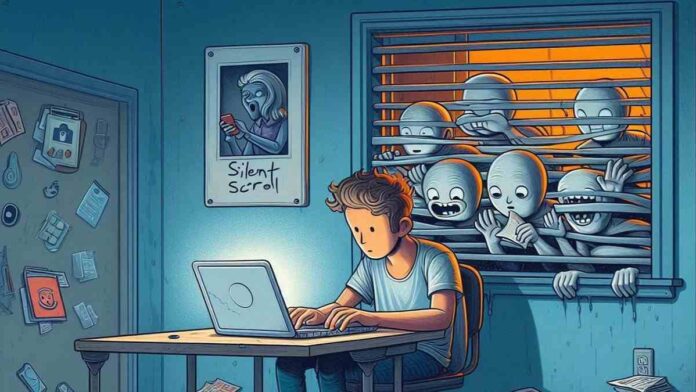SPAIN: In an age where online visibility often feels like a measure of existence, not everyone is eager to share their life with the digital world. Some individuals deliberately keep a low profile or avoid social media altogether, choosing to remain unseen in the endless stream of curated images, videos, and updates. The trend raises questions: is hiding from social media a sign of wisdom, fear, or something more complex?
The Changing Nature of Social Media
Over the past two decades, social media has grown from a networking tool into a central part of human interaction. Platforms such as Facebook, Instagram, X (formerly Twitter), TikTok, and LinkedIn have blurred the lines between public and private life. For many, posting updates is second nature, while for others, the pressure to constantly project an image feels overwhelming.
Also Read: Education in Transition: How Spain is Shaping the Future of Learning
Social scientists note that digital participation is not universal. According to a 2024 Pew Research Center study, around 30% of adults worldwide report using social media minimally or not at all. Among them, some reject these platforms entirely, while others maintain dormant accounts that serve one purpose: watching others.
Why People Hide
Psychologists argue that avoiding social media is neither inherently good nor bad. Instead, it reflects personal values, life circumstances, and mental health priorities.
- Privacy and Control – Many prefer to protect their personal life from digital scrutiny. In an era of cybercrime and data misuse, the instinct to safeguard one’s information is rational.
- Mental Health – Studies link heavy social media use with increased rates of anxiety, depression, and low self-esteem. Those who withdraw often cite relief from online comparison, bullying, or the addictive “scroll culture.”
- Focus and Productivity – Time is finite. Some professionals, students, and artists choose to channel their energy into real-life pursuits rather than maintaining a digital persona.
- Cultural or Generational Differences – In certain cultures, displaying private life online may conflict with traditions of discretion. Likewise, older generations often view constant sharing as unnecessary.
Dr. Elena Martínez, a Madrid-based psychologist, explains: “Avoiding social media can be a sign of emotional intelligence. People are learning that they don’t have to participate in the performance culture of likes and followers to validate their identity.”
Also Read: Spanish Olympic Committee Honors Emir Lahouari Benarba for Championing Olympic Values
The Quiet Observers
But while some hide entirely, others take a different approach remaining silent participants. These users avoid posting yet log in frequently to observe the lives of friends, colleagues, or even strangers.
Why?
- Curiosity: Social media offers an effortless way to stay updated without engaging.
- Comparison: Some measure their success or happiness against others’.
- Caution: They fear being judged if they share, so they prefer watching.
- Control: Silent observation allows them to gather information without revealing their own.
While seemingly harmless, this behavior can deepen insecurities. Dr. Martínez warns: “Passive consumption without expression often reinforces feelings of inadequacy. It becomes a cycle of comparison without relief.”
A Cultural Reflection
The act of hiding or watching silently speaks to a broader cultural tension. On one hand, modern society encourages openness, branding, and digital storytelling. On the other, the risks – data exploitation, misinformation, online harassment are real.
Media researcher Ravi Sharma observes: “Social media has created a paradox. People want to connect, but they don’t want to expose themselves. They want to know about others, but they fear being known.”
This paradox explains why some accounts remain blank, with no photos or posts, while their owners still spend hours scrolling through others’ lives.
Healthy Boundaries vs. Unhealthy Avoidance
So, is hiding from social media good or bad? Experts say the answer lies in intent.
- If avoidance stems from self-care, focus, or privacy, it can be healthy and empowering.
- If it reflects fear, insecurity, or compulsive comparison, it may signal underlying struggles that need attention.
The distinction is subtle but important. Social media is a tool, not a necessity. Just as one person may thrive without it, another may find purpose and connection in sharing online.
Education and Awareness
Educators and parents increasingly emphasize digital literacy, teaching not only how to use platforms but how to step back when needed. Schools in Spain, for example, now include modules on responsible digital habits, encouraging students to balance screen time with offline experiences.
For adults, the challenge is recognizing when observation becomes obsession. Experts recommend self-checks:
- How often do I log in just to “see what others are doing”?
- Do I feel anxious if I don’t check updates?
- Am I avoiding posting because of fear of judgment?
The answers may reveal whether one’s digital silence is a mindful choice or a quiet struggle.
The conversation around hiding from social media reflects a deeper shift in digital culture. As people grapple with identity, privacy, and mental health, the idea of digital minimalism is gaining traction. Books, podcasts, and workshops now advocate for conscious online engagement using platforms intentionally rather than compulsively.
In the end, silence on social media is not absence. It is a form of communication in itself a refusal to conform, a signal of boundaries, or a quiet cry for space in a noisy world.
As Dr. Martínez concludes: “Not being visible online doesn’t mean you don’t exist. Sometimes, it means you’ve chosen to live more fully offline.”
